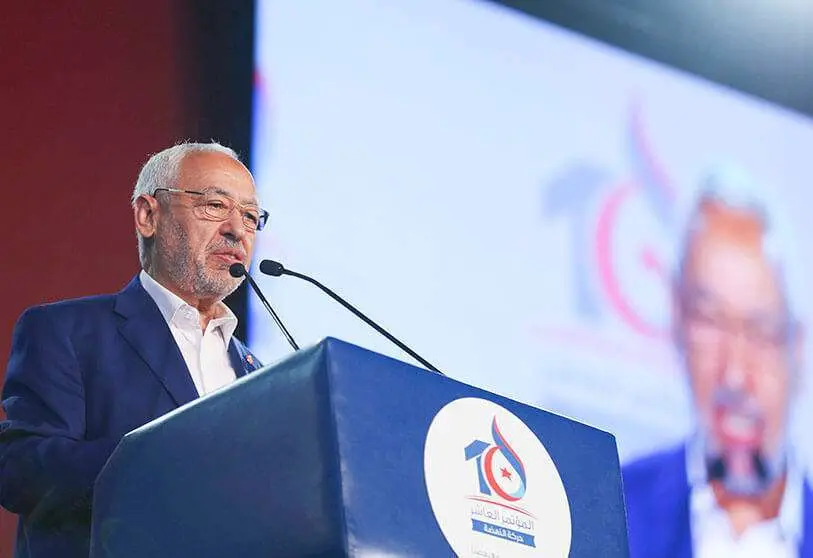The President of the Tunisian Parliament faces plenary session focused on dubious foreign diplomacy

The plenary session of the House of People's Representatives (HPR) is scheduled for Wednesday to question the controversial ties of its President Rached Ghannouchi (also leader of the Islamist Ennahda party) not only with Turkey, in reference to the war in neighbouring Libya, but also with the Muslim Brotherhood, considered a terrorist organization by several countries in the international arena.
Parliament holds a plenary session this day to examine the motion put forward by the anti-Islamic Free Destourian Party (PDL), led by lawyer Abir Moussi, to address the questionable parliamentary diplomacy of Rached Ghannouchi, in relation to the war in Libya and the contacts with Turkey and Qatar. These contacts underpin the Government of National Accord (GNA) led by Libyan Prime Minister Fayez Sarraj (recognised internationally by the United Nations since 2016) in his fight against the Libyan National Army (LNA) of Marshal Khalifa Haftar, which is allied with the Executive in the eastern city of Tobruk and supported by foreign powers such as Russia, France, Saudi Arabia, the United Arab Emirates and Egypt.
The plenary session will focus on Rached Ghannouchi's controversial contacts with the Turkish-Qatari axis present in Libya, and on another discussed link with the Muslim Brotherhood, a group investigated by several Western nations for terrorist activity (in fact, several leaders of the radical jihadist formation Al-Qaeda participated in the so-called Muslim Brotherhood), and which shows a radicalised tendency due to its drift towards Salafism (a rigid version of Islam). Several Tunisian political actors have criticised Rached Ghannouchi for exceeding the limits of his institutional role as president of The Assembly of the Representatives of the People of Tunisia and for his dubious diplomatic relations.

This session was established by the presentation of a draft motion by the PDL that rejects any foreign interference in Libyan affairs and deals with the positions expressed by certain blocs on parliamentary diplomacy.
Ghannouchi's aforementioned "suspicious" contacts abroad include: a recent trip to Turkey, when the country presided by Recep Tayyip Erdogan has a belligerent and interventionist position in both the Libyan and Syrian wars with a view to expanding into the Mediterranean; and also, conversations with the prime minister of the GNA, Fayez Sarraj, supported by the Turkish army and pro-Turkish mercenaries from Syria linked to former branches of terrorist groups such as Al-Qaeda, according to various media reports. This is a thorny issue, also taking into account that the United States wants to establish a military presence in Tunisia to counterbalance Russia's position in the Mediterranean by supporting the LNA in Libya and Bachar al-Asad's regime in the Syrian conflict.

According to rule 141 of The Assembly of the Representatives of the People of Tunisia, each chairman of a parliamentary bloc may submit a motion for discussion and adoption in the plenary session of the Assembly, for the purpose of announcing a position on a single issue, provided that the content of the motion does not relate to one of the motions governed by the rules of procedure.
Several political formations such as Qalb Tounes, Tahya Tounès and Al-Mustaqbal also saw the need to activate this parliamentary tool to question the actions being taken by Rached Ghannouchi.
Meanwhile, Ghannouchi himself called for popular support at this time: "Tunisians, the Tunisian elite and political parties, all sensitivities combined, to show more solidarity, to give priority to appeasement and to close ranks for the good of the Tunisian people" as reported by the media The Economist in Maghreb.
Ennahda, the Islamist party led by Ghannouchi, is going through difficult times for the loss of support after the last elections and with internal divisions reflected in the departure of Abdel Fattah Mourou, vice-president of the party and of the Parliament, and in the leaking of an internal document that dealt with the upcoming celebration of the eleventh congress of the party to evaluate the situation of the formation, as reported by the media Arabi21. Several prominent members of the political grouping, such as Nour Eddine Arbaoui, Ennahda's political relations officer, and Abdel Karim Harouni, the chairman of the party's advisory council, came forward to show their strong support for Ghannouchi.
All this comes at a time of uncertainty within Ennahda, with murky affairs linked to Rached Ghannouchi suspicious wealth. Tunisian activists have already warned about it and many figures are considered about the money accumulated by the president, while media such as Al Ain News estimate a range between 1 and 8 billion dollars, of dubious origin. A figure that grew exponentially, according to various media, following his return from exile in 2011, when the past dictatorship of Zine al-Abidine Ben Ali ended.
This approach joins the commented links between Ghannouchi and the Muslim Brotherhood.

This kind of grouping would bring in significant amounts of money, as in the case of Tunisia, according to Al Ain News. Thus, the activist Mourad Nouri indicated that large sums of money have arrived in Tunisia, mainly from Qatar and Turkey, to finance the activity of the Muslim Brotherhood. Most of these transactions are disguised as remittances sent to finance organizations dedicated to charity or the teaching of the Koran. In this line, Zubair al-Shahoudi, former secretary general of the Muslim Brotherhood in Tunisia, accused Ghannouchi and his family of getting rich by diverting this type of funds.








